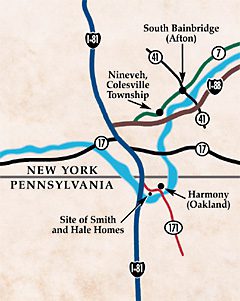
(Map from LDS.org)
I’m continuing on with my little series about the character of Joseph Smith and his family. These posts are drawn from a yet-unpublished book manuscript with which I tinker from time to time:
Newell Knight described Joseph in particular as “kind,” and others who knew him recalled his compassionate actions and attitude.[1] “We found him a boy of truth,” remembered Joseph Knight, Jr., of the twenty-one-year-old farmer’s son.[2] “So honest and plain were all his statements that there was no room,” said Newell Knight, “for any misgivings with me on the subject.”[3] Knight recalls the testimony of Josiah Stoal during a hearing against Joseph Smith in South Bainbridge, New York, in 1826, when the question of Joseph’s honesty arose in connection with the purchase of a horse:
Q.—“Have you had your pay?”
A.—“That is not your business.”
The question being repeated, the witness replied, “I hold his note for the price of the horse, which I consider as good as the money; for I am well acquainted with Joseph Smith, Jun., and know him to be honest, and, if he wishes, I am ready to let him have another horse on the same terms.” [4]
[1] See the account of Newell Knight (at Andrus and Andrus, They Knew the Prophet, 7); also anecdotes related by Heber C. Kimball (ibid, 42-43) and George A. Smith (ibid, 53).
[2] Andrus and Andrus, They Knew the Prophet, 5.
[3] Andrus and Andrus, They Knew the Prophet, 7.
[4] LeRoi C. Snow, “How Lorenzo Snow Found God,” Improvement Era 40/2 (February 1937): 82-84, 105. It should be kept in mind that this transaction and examination took place in an era when, in the United States, horse theft was a capital offense.










